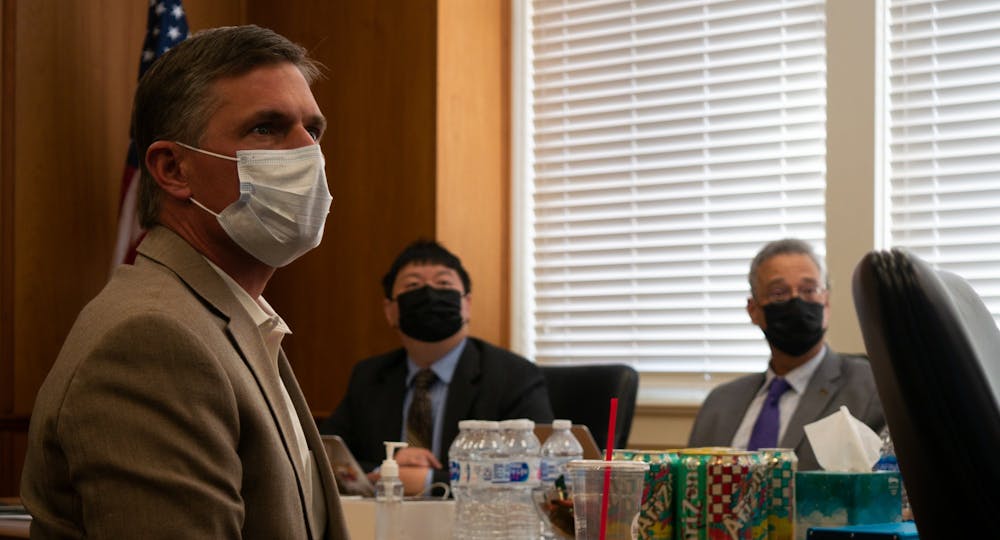Sen. Martin Heinrich, D-N.M., visited the University of New Mexico on Thursday, Feb. 24 to discuss two UNM professors’ research on sensors designed to detect methane leaks along natural gas pipelines.
Research associate professor Lok-kon Tsui and distinguished professor Fernando Garzon are leading the research, which was awarded $1.5 million from the Department of Energy, according to the UNM Newsroom.
The meeting largely consisted of Tsui, Garzon and Kamil Agi, a representative of SensorComm Technologies, UNM’s partner in developing the sensor technology, explaining how the sensors detect methane emissions along pipelines.
“Over the course of the past two years, we’ve made a number of improvements to the design of our sensor. We started off really crude — hand-made devices — and then ended up with a design right here,” Tsui said at the meeting, referring to a 3-D printed, approximately 2-centimeter final design.
The key to the sensors having accurate readings is the use of machine learning to differentiate between the different types of methane emissions and transmitting those readings for data collection. The sensors could detect methane emissions from “wetlands, bovines and natural gas,” according to a handout from the Center for Micro-Engineered Materials at UNM.
“We are happy to claim greater than 99% accuracy in order to identify what mixtures that these (methane emissions) are coming from,” Tsui said in the meeting.
In an interview with the Daily Lobo following the meeting, Heinrich emphasized how these methane leaks are often overlooked when it comes to efforts to combat climate change.
“Historically, if you think about fossil gas and emissions, you’re thinking about the furnace in your home,” Heinrich said. “But if we’re leaking that fossil gas in the mid-stream pipeline, that could be far worse for the climate than even the emissions at the end use.”
Oil and gas emits about 13 million metric tons of methane each year, according to a five-year study conducted by the Environmental Defense Fund in 2018.
“The new study estimates the current leak rate from the U.S. oil and gas system is 2.3%, versus the current EPA inventory estimate of 1.4%,” an EDF press release reported in 2018. “Although the percentages seem small, the volume represents enough natural gas to fuel 10 million homes — lost gas worth an estimated $2 billion.”
The sensors are still being researched and tested with future research to be conducted at the Colorado State University Methane Emissions Technology Center.
“They’ve got several simulated parts of natural gas infrastructure … We’re going to be primarily targeting, at their facility, underground pipeline emissions,” Tsui said at the meeting.
Get content from The Daily Lobo delivered to your inbox
Heinrich said it’s important to both limit current emissions as well as transition as many processes to renewable energy as possible.
“We want to squeeze as much methane out of the current system while we implement the long-term solution, so you have to do both at the same time. You have to kind of walk and chew gum to bring, to maximize, how quickly we can bring down emissions overall,” Heinrich said.
Heinrich also emphasized how important it is that New Mexico “leads the charge” for developing new technologies to combat climate change.
“We’re feeling the front edge of climate change in a way that some communities simply aren’t. That makes it even more important that we’re a part of the solution,” Heinrich said.
John Scott is the managing editor at the Daily Lobo. He can be contacted at managingeditor@dailylobo.com or on Twitter @JScott050901






